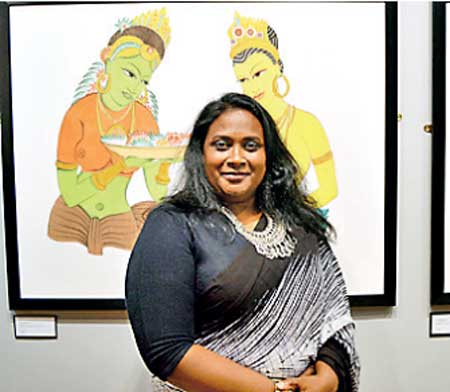Tuesday Feb 24, 2026
Tuesday Feb 24, 2026
Friday, 29 September 2017 00:00 - - {{hitsCtrl.values.hits}}
 By Jayamini de Silva
By Jayamini de Silva
One of the most regressive ideals that sadly continue to thrive in most parts of South Asia is the obsession with fairness. Many people still take an instant, inexplicable dislike towards someone of a darker skin tone, without even getting to know the person first. Dark-skinned South Asians forcefully confront a malicious cultural complex, leading them to be viewed somehow as less desirable.
Being fair skinned scores points very quickly when it comes to women. For example matrimonial adverts stating the colour of the potential bride’s skin, there is no doubt that fair skin is seen as superior to all varieties of features people have, originating from South Asia.
In a region where the majority of people are dark skinned, the overriding factor to determine whether a girl is beautiful or not is decided by the fairness of their skin. My initial thought was this unhealthy obsession with having fair skin was psyche created by long years of colonial hangover, but it seems it has long prevailed in  countries like India, Bangladesh, Pakistan and Sri Lanka. A pale skin is associated with superiority ranging from the caste system, where the upper castes supposedly being fairer skinned than their lowlier fellows as well as rulers from the Aryans well before the European colonialists.
countries like India, Bangladesh, Pakistan and Sri Lanka. A pale skin is associated with superiority ranging from the caste system, where the upper castes supposedly being fairer skinned than their lowlier fellows as well as rulers from the Aryans well before the European colonialists.
Regrettably, even modern societies seem to consider fair skin as a critical factor leaving dark-skinned individuals been stigmatised. The popularity of this mindset has mounted enormously in recent decades thanks to marketing of skin-bleaching items that have gained a massive following. Research findings have been concluded that fair skin positively correlates to jobs, education, income and marital status. Complexion has become a barrier for girls to reach their full capacity.
Growing up I’ve carried many unpleasant memories and experiences that stem from having a dark skin. In my school days, I was known by some demeaning terms such as ‘Kalu’ (Blakie) or ‘Kalu Kella’ (Black girl) and in teen years and beyond as ‘Kalu kumi’ (roughly translates as Turkey); but have to say not always with malice in their tone. But one encounter I fondly remember is, when I was in rural China on a study tour, very hospitable elderly villagers who’ve never seen a black woman, come up to me and affectionately checked whether I have applied some black ink over my skin.
When I set my mind on creating my art work addressing this issue, I came across a beautiful poem by Jennifer Asiedu and it’s become my inspiration of my work.
My black is flawless
I’ve never been this proud before
My skin never felt so good
Was I not used to it?
I can’t remember when I loved this shade so much
My color is dark and lovely.
It sings with a rhythmic melody of beauty.
My black is loud
It yelled at this pale-faced lady the other day
She tried to demean my black
And just as quickly as she did
My black screamed back.
My skin roared with elegance
Reminding you it is not afraid anymore
My black is loved
I rubbed it down tenderly today
Making sure to touch every inch.
Ever so gently it glistened and radiated
My black shimmers and still catches attention.
It’s been kissed and hugged
Yet still selfishly wants more
My black is hopeful
I’ve had a freedom that was honestly free
I’ve lived in a time when my black was OK
My black lives today safely from oppression
Though still hated on
My black believes in a better tomorrow
Still lives in dreams of liberation and equality
My black has a great future
My black is an artist
Thoughtfully chosen to be just this
Not chocolate, not sweet or bitter
My black creatively exists where no other black lives
My deep and rich black is still unmatched
Nothing as dark
It masterfully advances my own natural look
My black is resilient
Offended and hurt in the past
The complexities of this complexion cannot be understood
I took my black out for a day
And was terribly made fun of growing up
People hold no discretion or reservation against my black
As though a fugitive my black has been ostracized,
attacked and found guilty
Yet still fought back
Rising against the contempt of others
My black isn’t weak and advocates for me.
My black isn’t always easy
But I am my black and my black is me.